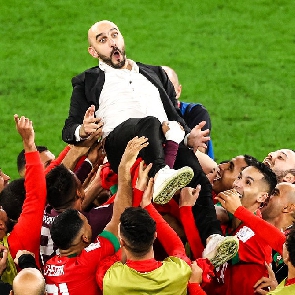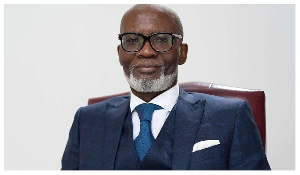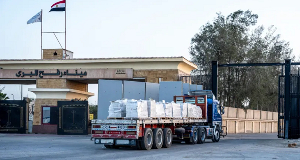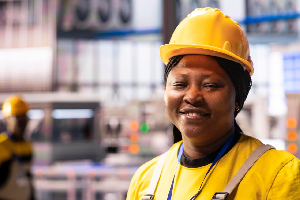Moments before the historic match between Morocco and Brazil kicked off at the Ibn Batouta Stadium in Tangier, a symbolic banner was erected by the Ultras.
The inscription was “Morocco is leading the African football”. A simple, yet powerful message. On a first read, there is the temptation to associate the message with the Atlas Lions’ incredible achievements at the 2022 World Cup.
But it goes deeper than that.
Since 2013, Morocco has hosted three FIFA Club World Cups including the latest edition which saw Real Madrid beat Al-Hilal in the final.
The North African country has also hosted the Trophée des Champions for the second time in 2017 and the 2018 Supercopa de España.
More recently, the kingdom has become a home for quite a number of African countries. Between July 2019 and January 2022 Morocco has played all but three qualifiers and friendlies at home. This was due to most of their opponents having national health issues, political unrest, and infrastructural limitations.
During the latest international window, different countries once again converged to play their games in Morocco. Advisor to the Royal Moroccan Football Association, Omar Khyari reveals it’s been a busy period for the country.
“We have more than 14 countries playing qualifiers and U23 AFCON friendlies ahead of the tournament which will be here in Morocco. For us, we are ready to organise main football events. Right now we have more than 20 games happening here in Morocco at the same time. For us is something normal because we have six stadiums approved by FIFA.”
The swarming of infrastructure in Morocco isn’t by coincidence. It’s a result of years of planning and execution according to Khyari.
“In 2017 His Majesty the King of Morocco, Mohammed VI, presented his vision of more cooperation and more implication of our kingdom into the African continent. At the Moroccan Football Association under the vision of the king, we are trying to implement the King’s vision.
In terms of football, we have more than 45 partnerships with other African football associations and that is why we continue to host to exchange and expertise with them because the success of African football will not be individual but collective. We want teams to feel at home when they come to Morocco.”
Morocco has only hosted the Africa Cup of Nations (AFCON) once in their history which was back in 1988. The North African country replaced the initial host Zambia who withdrew due to financial challenges.
The country came close to hosting the continental showpiece in 2015 but failed to do so after a dispute with the Confederations of African Football (CAF) after an outbreak of the Ebola virus epidemic in West Africa.
Eight years later and Morocco is back in the mix and could potentially host the AFCON in 2025. Guinea, chosen in 2014 to stage the biennial tournament, withdrew last year after little progress had been made in preparations.
Morocco will compete with neighbors Algeria, South Africa, Zambia, and a Benin-Nigeria for the hosting rights of the 2025 AFCON. Khyari believes Morocco is in a position to host the best-ever AFCON.
“It will mean a lot for our country and the people. We have shown to the world during the Qatar 2022 World Cup that we are very passionate about football as a country. Everyone Moroccan from every aspect of life cheers for football. We haven’t hosted the AFCON in a long time and we hope that CAF will choose us. We plan to host the best AFCON and welcome the whole of Africa.”
The journey for Morocco won’t just end in 2025. The country has also put together a joint bid for the 2030 World Cup alongside Spain and Portugal. Collective success usually relies on a reliable and consistent spine. Morocco over the years has demonstrated it can be that spine that leads the charge for African football.
Sports News of Thursday, 30 March 2023
Source: SPONSORED













